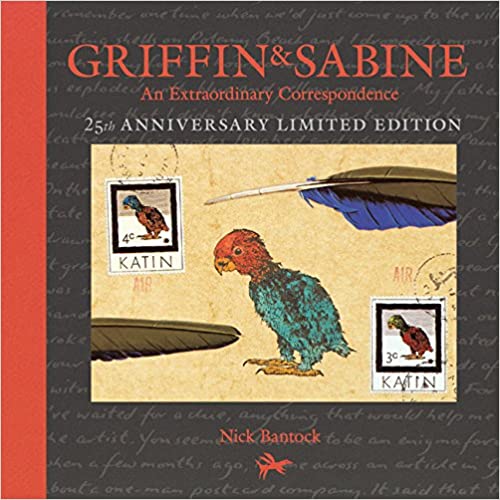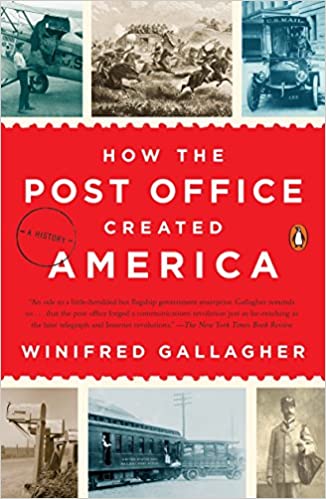Given the recent news, we’ve been reminded just how vital the postal service is for our everyday life. With the June 2020 appointment of Louis DeJoy as the new Postmaster General, the USPS has seen a sharp decline into crisis; with the November presidential election rapidly approaching, many are concerned at what this means for mail-in ballots. Furthermore, for many indigenous, rural, and/or low-income communities, as well as incarcerated folks and people who need medication delivery, the USPS is often the only reliable source.
If this sobering turn of events has got you ruminating on the importance of mail delivery, below are ten books in which letters and the postal service—or lack thereof—play a crucial role. Ranging from academic studies about the diverse history of the USPS to a novel with original postcard artwork, these are books to write home about. (You should write home about them, and don’t forget to mail the letter!)
DeJoy now promises to suspend his mail-delaying shenanigans, but only because there’s been so much hue and cry. If you’d like to get in on that action, there are a number of ways to help support the USPS. Texting “USPS” to 50409 is an easy and time-efficient way to contact your representatives; here is a list of compiled resources of petitions and action items; and, of course, I firmly believe that one can never own too many stamps.
The Postman by David Brin
In Brin’s dystopian vision for America, the USPS is painted as the only source of hope. In The Postman’s post-apocalyptic world, a man puts on an abandoned USPS uniform and tries to barter mail for food. However, his initial fraud snowballs, as he claims to work for the “Restored United States of America” and civilians cling to the idea of a centralized government’s return. Meanwhile, the U.S. is ravaged by bio-engineered plagues and a group of white supremacist, misogynist, and hypersurvivalist militia. The Postman, AI scientists, and other opposition groups must band together to fight for the future of civilization. Originally published in 1985, Brin’s sci-fi novel resonates uncomfortably true in our current-day society.

All My Mother’s Lovers by Ilana Masad
In Masad’s debut novel, a woman does her own postal delivery (as we’ll probably also be forced to if things don’t improve). When Maggie’s mother dies abruptly in a car crash and leaves behind five letters, Maggie is determined to hand-deliver the sealed envelopes to each address. Although Maggie always thought her mother, Iris, had the picture-perfect marriage, she realizes there was much more to Iris’s past than she ever dreamed of. All My Mother’s Lovers is a warm-hearted and intriguing exploration of family, the imperfect nature of relationships, the intersections of sexuality, gender, and identity—and how much five letters can change someone’s life.

There’s Always Work at the Post Office: African American Postal Workers and the Fight for Jobs, Justice, and Equality by Philip F. Rubio
The Postal Service was the first public service to hire women and Black workers, and continues to have one of the most diverse workforces today. There’s Always Work at the Post Office highlights the stories of Black postal workers, and the ways in which they fought for a more equal work environment. A history professor and former postal worker, Philip Rubio shows how civil rights movements and Black labor protest traditions combined to help establish postal unions in 1971. For another analytic look that discusses how gender, race, and class play out within the USPS, try Linda B. Benbow’s Sorting Letters, Sorting Lives: Delivering Diversity in the United States Postal Service.

Possession by A.S. Byatt
Byatt’s Booker Prize-winning 1990 novel is all about the paper trail we leave behind, and what others may make of it later on. Two scholars’ paths converge through letters, as they uncover a potential love affair between two famous fictional poets. Poring over drafts and getting tangled up with academic power struggles, the scholars make it their quest to find out the truth behind the letters. Byatt highlights our society’s obsession with written “truth” and explores what it means to collect historical artifacts, challenging the reader to ask questions about a text’s authority and the concept of possession itself.

Going Postal by Terry Pratchett
Feeling like our news is getting rapidly more absurd every day? Try Pratchett’s satiric take on the mailing system, set in his fantasy city of Ankh-Morpork. Moist von Lipwig, a con man, is forced by the city’s ruler to take over the decrepit Postal Service (for context: his other alternative is death). Faced with piles of undelivered mail, Moist must step up to his position to invent postage stamps, hire golem messengers, and fight off the monsters of communication monopoly. (And if you’re interested in Pratchett’s anti-capitalist take on banking, follow along with Moist’s further adventures in Making Money!)

Griffin and Sabine: An Extraordinary Correspondence by Nick Bantock
If you’re looking for a hands-on, fantastical adventure involving letters, Griffin and Sabine is the perfect interactive read for you: author and illustrator Bantock crafts a book where you can directly take letters out of colorful envelopes. Griffin Moss is a card designer in London living a lonely and bland life, until he receives a congratulatory (albeit mysterious) note about one of his postcards from a stranger in the South Pacific Islands. The stranger, Sabine Strohem, is a postage stamp illustrator. The two start up a correspondence, showcasing their personalities through their heavily-illustrated missives. The lovers’ story is part of a trilogy, continuing on in Sabine’s Notebook and The Golden Mean.

84, Charing Cross Road by Helene Hanff
Before email and the Internet, the postal service was also the sole means of international communication. This 1970 classic is formed of real-life letters between Helene Hanff, a writer in New York City, and Frank Doel, an antiquarian bookseller at Marks & Co., 84 Charing Cross Road, London. The two bond over obscure British literature and their friendship blossoms into a twenty-year correspondence. Adapted into a popular play and film, Hanff’s collection of letters show both the literary and personal value of having a pen pal.

How the Post Office Created America: A History by Winifred Gallagher
Did you know that the Founding Fathers established the postal system before signing the Declaration of Independence? Gallagher tracks why and how the development of the U.S. Post Office was crucial in binding the individual colonies into a centralized United States, and grew to impact every branch of American life as we know it today, such as industrialization, consumerism, migration, and settler colonialism. Public postal services have been a cornerstone of U.S. democracy since the beginning, and will continue to be vital in 2020’s upcoming presidential elections. If you’re interested in further reads that contextualize the historic significance of the USPS, check out: Neither Snow nor Rain: A History of the United States Postal Service by Devin Leonard.

Post Office by Charles Bukowski
Yes, I know. Bukowski. But listen: Post Office, the autobiographical work that catapulted Bukowski to national fame in the 1970s, is an extremely apt fit for this list. The book describes the day-to-day drudgery and debauchery of Henry Chinaski, who works as a mail carrier and sorter for the USPS. Between escaping guard dogs and dealing with hangovers, Bukowski’s anti-hero provides a biting look at America and the Postal Service.

The Postal Service Guide to U.S. Stamps, by the United States Postal Service
Lastly, if you want a book by the USPS (who knew they wrote books!) and/or are an avid stamp collector, consider flipping through The Postal Service Guide to U.S. Stamps. Starting from the 1845 Postmasters’ Provisionals to today’s stamps, this vividly-colored guide documents every single kind of U.S. stamp. Perhaps a good addition to your coffee table, while you sit there writing letters?
The post 10 Books About the Importance of the Postal Service appeared first on Electric Literature.
Source : 10 Books About the Importance of the Postal Service













